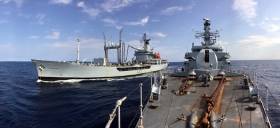Displaying items by tag: RFA Gold Rover
Final RFA ‘Rover’ Retires to Join Sister in Birkenhead
#RFAoiler - The oldest of the UK’s Royal Fleet Auxiliary tankers a ‘Rover’ class which made a rare visit to Dublin Port in recent years, was officially decommissioned last month, writes Jehan Ashmore.
RFA Gold Rover (A271) a 11,522 tonnes single hull displacement tanker was a rare visitor to an Irish port given the 'oiler' was a part of the Royal Fleet Auxiliary and not the Royal Navy. The RFA have a civilian-manned fleet which provides support for warships, assiting the Royal Navy to maintain operations around the world.
Almost a year ago RFA Gold Rover arrived offshore of St. Helena on Friday 20 May for the crew to enjoy the St Helena’s Day celebrations.
The veteran RFA Gold Rover was built by Swan Hunter, Newcastle Upon Tyne in 1974 as the leadship of five sisters. She served replenishment at sea (RAS) duties to the Royal Navy during global operations. Currently the tanker is along with a sister, Black Rover which according to Ships Monthly, is berthed in Birkenhead while awaiting scrapping.
Not only are the 'Rover' class disposed but also the ageing 'Leaf' class single-hulled tankers. They are to be replaced by new 'Tide' class newbuilds on order from a shipyard in the Far East. According to the Royal Navy, the first of the new support ships, RFA Tidespring has arrived in UK waters as the first of the quartet of ‘Tide’ class tankers.
The 39,000-tonne tanker which also has a 19,000 cubic metres capacity for fuel and 1,300 cubic metres of fresh water will not enter service immediately. Instead, RFA Tidespring will undergo further intensive work and customisation programme at A&P Falmouth.
RFA Tidespring is expected to enter service before the end of the year. The new class will provide key support to ‘Queen Elizabeth’ Class carriers when they too come into service, alongside the wider fleet.
Royal Fleet Auxiliary Replenishment Tanker On Five-Day Courtesy Call
#RFAtanker – A UK tanker of the Royal Fleet Auxiliary, RFA Gold Rover (A271) that has a supporting role in the Royal Naval, arrived into a foggy Dublin Bay to dock in the capital for a five-day courtesy visit, writes Jehan Ashmore.
The visit of RFA Gold Rover of 11,522 tonnes displacement coincides on this UK August Bank Holiday Monday and notably she is a rare visitor to an Irish port given that she is a member of the Royal Fleet Auxiliary.
Her visit follows another important large British naval caller when the Royal Navy's HMS Illustrious (R06) as previously reported on Afloat.ie called to the capital in April 2013. This was to be the final visit to Dublin of the former air-craft carrier which during her call was scaled down to helicopter duties. She is to be decommissioned later this month.
The 140m (461ft) long RFA Gold Rover sailed from Loch Striven Oil Fuel Depot on the Scottish west coast and understood to be under the command of Commanding Officer Shaun Jones. The crew is made up of 16 officers and 31 ratings, totalling 60 crew members.
On arrival in Dublin Bay, RFA Gold Rover took a pilot from the cutter, Camac. When within the port’s channel fairway she was greeted by the ports pair of tugs, Beaufort and Shackleton which escorted her to the Deepwater Quay Berth or ‘Coal’ Quay along the south quays.
RFA Gold Rover is the longest serving 'Rover' class remaining in RFA service since her commissioning in 1974. In that first year, she participated in evacuation duties during the partition of Cyprus when Turkey invaded the island.
The 'Rover' class represent one of the most successful tankers designed by the UK Admiralty. They were all built by Swan Hunter Shipyard of Tyne and Wear. The primary roles are to replenish Royal Naval ships at sea with fuel, oil aviation fuel, fresh water in addition to supplying dry-cargo and refrigerated stores.
RFA Gold Rover's most recent major deployment was in the South Atlantic which saw her maintain warships kept on station at sea for a two-year timeframe which was completed in 2013.
During those two years, she totalled 91,860 nautical miles since leaving Portland, Dorset and her ports of call included Gran Canarias, Ascension, St Helena and South Africa. This saw her crew rack up 7,789 man-hours on watch while refuelling and restoring RN ships on patrol duties, with food, equipment, spares, medical supplies, water and other stocks.
In April of this year, the 40 year old tanker underwent a refit at Cammell Laird Shipbuilders and Repairers in Birkenhead, though as the eldest of the fleet, her days are numbered. The ageing 'Rover' and 'Leaf' class single-hulled tankers are to be replaced by new 'Tide' class newbuilds on order from a shipyard in the Far East.


























































